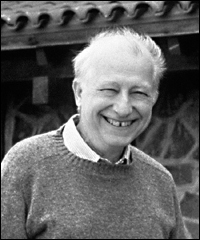Costas Papaliolios
Memorial Minute
At a meeting of the Faculty of Arts and Sciences on December 16, 2003, the following Minute was placed upon the records.
Costas Papaliolios, Professor of Physics and Physicist at the Smithsonian

Astrophysical Observatory, scientist, educator, and a delightful human being, succumbed to lung cancer on June 6, 2002; he was 71.
Cos, as he was universally known, grew up in the melting pot of mid-century Brooklyn, one of two sons of Greek immigrant parents from the little town of Limni on the island of Evia. His English displayed only a trace of Flatbush, and his Greek was evidently fluent, for he was summoned and questioned by government authorities when he was vacationing in Greece in 1965, as he lacked the army discharge papers required of their male citizenry. He attended PS92 in a first (and highly successful) experiment in grouping by academic ability, and then Brooklyn Technical High School, before going on to Rensselaer Polytechnic Institute for a B.S. in Physics. Several years in the Army, Bell Telephone Laboratories, and Motorola intervened before Cos came to Harvard for his Ph.D. in Physics (1965), where he remained happily for the rest of his career.
Cos’ scientific contributions were characterized by a spirit of ingenuity and elegant simplicity. An early example involved quantum mechanics, the contemporary understanding of nature on the scale of atoms and molecules, where events are believed to happen in a probabilistic manner. This view has proved philosophically troubling, even for the likes of Einstein, who famously protested that God does not play at dice. Cos devised a stunningly simple experiment that set severe limits on theories that attempt to offer deterministic alternatives.
Much of his subsequent work revolved around novel techniques in optical ground-based astronomy, for example speckle interferometry, coded-aperture spectroscopy, precise time-resolved studies of pulsars, and a novel event-driven low-light imaging camera that bears his name, approximately: the PAPA camera. In a recent burst of creativity, Cos helped devise an elegant method to search for planets orbiting distant stars: by using a specially tailored – apodized – square telescope pupil, instead of the conventional round aperture, a star’s diffracted glare can be suppressed to an astonishing degree, so that nearby planets may be seen. Along the way, we learned from Cos that the term apodized comes from the Greek, “to cut off the foot,” in this case those feet being the diffracted sidelobes of the star’s image.
But the spirit of this man is hardly captured in a mere accounting of his scientific accomplishments. Cos enjoyed life, and he took pleasure in all the things he was doing. Even when he had something to complain about, he would do it in an almost joyous way. As one colleague remarked, “he could make lemonade out of any lemon, and it would be properly sweetened.” For example, he amusedly pointed out to a student, who reports that he is unable ever to forget it, that Phillips-head screws are stupid – the grooves are deepest where the lever-arm is smallest.
Quite unselfconsciously Cos always projected an inner serenity and an utter lack of egoism that made him immediately accessible to students, faculty colleagues, and fellow researchers. For that same reason he was able to work with great effectiveness on complex research problems over a wide spectrum of subjects, as well as teaching large, demanding courses, without ever worrying about taking credit for those successes.
The Crimson’s Confidential Guide to Courses – not renowned for its polite treatment of faculty – had this to say: “Professor Costas D. Papaliolios, in addition to his melodic name, is a wonderful human being. Always happy to see you, he welcomes questions from the class and his door is always open. He is one of the few professors that will stop you in the Yard to say hello.” Cos cared deeply for Harvard, for his students, and for his fellow human beings. One didn’t need to ask him for help; he just seemed to know who needed assistance and he provided it without being asked.
In remembering him, there instantly springs to mind his image, always with a quiet smile, and ready either to tell of his current research excitement, or to present you, out of the blue, with a little gift – usually a delicacy he had prepared from a Greek recipe. In time, one came to realize by such tokens that his heritage was another silent but powerful source of his inner strength. That strength became most obvious when, at last knowing that he was soon to die of incurable cancer, he continued on his work and his friendly encounters, without seeming to give himself over to thoughts of the darkness looming before him.
He leaves his sons Andreas and Dimitri, his brother Achilles, and a multitude of friends, colleagues, and students deeply saddened by his passing.
Respectfully submitted,
Howard C. Berg
Nathaniel P. Carleton
Gerald Holton
Robert V. Pound
Paul Horowitz, Chair




